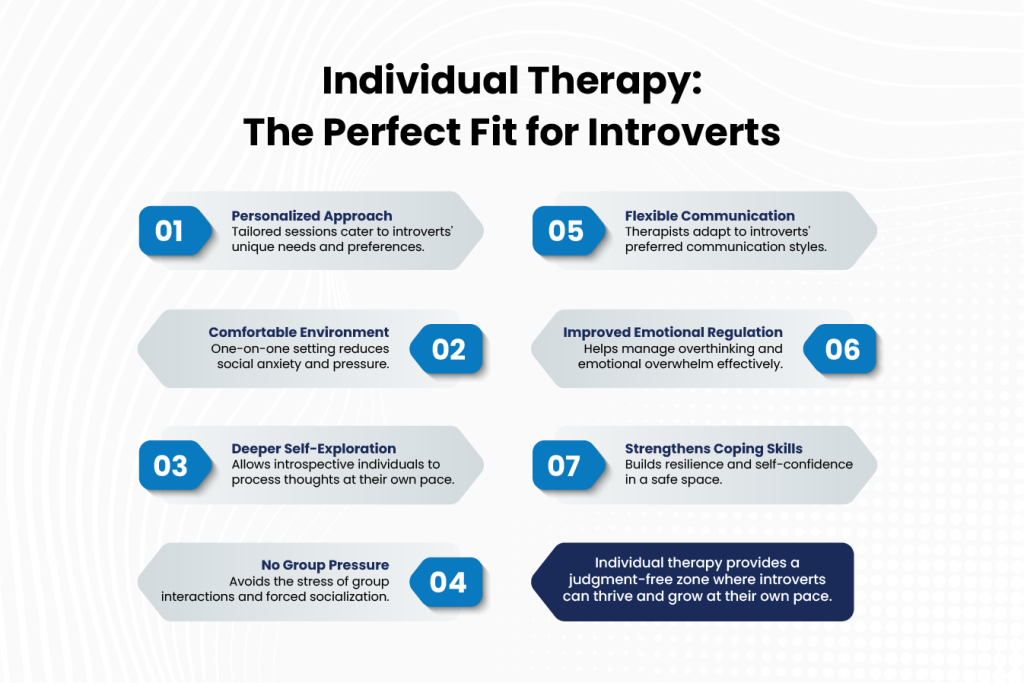In this highly stressed world, many introverts indeed are at the receiving end of various pressures and constant interaction. The very definition of introversion, namely, a preference for solitude, introspection, and deep thinking, can withstand tremendous teleological thrust when the entire gamut is utilized correctly. Psychotherapy for introverts could focus on general mental health issues while honoring this individual’s special need for space and time to think. The article explains why individual psychotherapy best fits the introverted temperament, with a description of benefits, structure, and how effectively it builds special bridges to the therapy of introverts.

Understanding Introversion and Its Unique Needs
The most common understanding of introverts in society is that they are either shy or anti-social; neither can be said to be true. An introvert would rather have a long and meaningful conversation one-on-one than engage in many social activities. Their inner scapes are rich and attuned to the external environment. They process this environment in a way that one could suspect requires solitude. Group therapy or high-action activity is sometimes considered unacceptable to cater to their requirements. Individual Psychotherapy creates an environment in which the therapist offers help with the client’s experiences regarding their thoughts without taking on the therapist’s agenda.
The Core Benefits of Individual Psychotherapy for Introverts
A Personalized and Private Setting
One of the primary benefits of Individual Psychotherapy is the individual approach to treatment. Unlike group therapy, where numerous others are invited to share their input on the client’s concerns, in individual therapy, the attention and concern of the therapist are strictly toward one individual being treated, fostering a sense of confidentiality wherein introverts feel safe to open up without being judged or interrupted. Such confidentiality is crucial for introverts who find public situations energy-draining.
Therapists specializing in psychotherapy for introverts recognize that each client’s journey is unique. They can adjust their methods to match the client’s pace, whether that involves gradually exploring difficult emotions or delving deeply into personal histories.
Personalized Experiences and Deep Reflection
- For many introverts, group settings can feel intimidating when they are required to express their inner thoughts and feelings.
- Individual Psychotherapy provides a safe space for deep reflection, allowing introverts to explore their emotions and experiences without pressure.
- This approach encourages clients to speak freely at length without the need to fit into a group dynamic.
- Therapists specializing in this method use probing questions to help introverts gain self-awareness and better understand their inner world.
Building Self-awareness and Emotional Resilience
A well-resourced and also sound-quality psychotherapy is designed to lead to improved self-awareness for the clients. For introverts, the growth of this self-understanding can become miraculous. This process is Individual Psychotherapy, where clients will probe their inner narratives, become aware of how past incidents really have an impact on behaviors today, and learn to build defenses against stressors. Such therapy helps the introvert understand and appreciate individualistic traits rather than changing for the sake of other extroverted people.
Overcoming Social Anxiety and Enhancing Communication Skills
Sadly, introverts may find themselves withdrawn from social situations, not necessarily because they are hopelessly lacking in social skills but because their overstimulation often leads to anxiety. Therapy can create avenues for the introvert to learn how to deal with this kind of social anxiety, become a better communicator, and learn how to set good limits.
The therapists generally ensure that the clients are involved during these individual sessions to experience a maximum number of techniques, such as exposure to what conditions actually trigger the anxiety and having the patients identify them while teaching coping mechanisms like mindfulness and cognitive-behavioral techniques.
Flexibility and Adaptability in Treatment
Every man’s therapeutic journey is unique, and Individual Psychotherapy lives up to this by being very malleable to the changing needs of the client. For the introvert, this means that therapy can take an incoming pace where it would not feel intrusive in any way. Therapists can tailor therapy sessions to address immediate issues or build personal development over time and even continue to be flexible and effective. Flexibility must be there, especially when processing issues of anxiety, depression, or even traumatic events from the past.
How Professional Help for Introverts Makes a Difference
Creating a Safe and Trusting Environment
Indeed, one of the most important ingredients in worthwhile therapy is trust. Individual Psychotherapy offers such an environment for introverted people who may not be comfortable revealing personal information in less intimate spaces. Therapists know psychotherapy for introverts to be very confidential and create an atmosphere where clients can be genuinely safe.
Addressing Individual Challenges with Empathy
No two people’s roads are similar. Introverts face many such challenges that require specific considerations. From overloads, societal demands, and inner expectations of perfectionism, Therapy for introverts assembles all strategies that meet these hurdles. Therapists for psychotherapy for introverts are capable of equipping themselves with these technicalities to administer reinforcement for introverts, such as professionals who know how to address them in terms of their inner world. Mindfulness, reflective journaling, and a gradual approach might be suitable techniques to hit issues relevant to introverts.
Emphasizing Growth Through Self-Exploration
The process of self-exploration, then, is one of individual therapy, and it bears all the hallmark tracks that are ideal for introverts. The self-exploration of self-thoughts, self-emotions, and self-behavior in such a controlled environment would lead to profound self-growth. It could guide introverts out of making transitions in their minds from self-denunciatory to self-compassionate internal chatter.
Integrating Psychotherapy into Daily Life
One of the initial steps in psychotherapy for introverts is setting achievable goals. These goals might include managing anxiety in social situations, improving self-esteem, or simply creating more balance between solitude and interaction. A skilled therapist will work with the client to break down these goals into manageable steps, ensuring that progress is both realistic and measurable.
Related Articles:
- Benefits of Individual Psychotherapy
- Psychiatric Evaluation Questions
- Comprehensive Psychiatric Evaluation
Embracing the Benefits of Individual Psychotherapy
Individual Psychotherapy is more than just a treatment modality; it is a lifeline for introverts seeking a deeper understanding of themselves and a path to enhanced well-being. Through personalized sessions, communication, and a focus on deep reflection, psychotherapy for introverts provides a nurturing environment where clients can thrive. Whether you are looking for therapy for introverts, need conversation help for introverts, or are simply seeking professional help for introverts, individual therapy offers a compassionate, flexible, and effective route to emotional health.
Ultimately, psychotherapy for introverts is not just about overcoming obstacles; it’s about celebrating who you are and using your natural abilities to create a life filled with genuine connection, thoughtful reflection, and personal growth. For personalized mental health support, contact Reynolds Psych NP. Our experienced team specializes in therapy for introverts, providing a safe approach to their well-being. Call (262) 999-7350 or email [email protected] to begin your healing journey today.
Frequently Asked Questions (FAQS)
Why is individual psychotherapy for introverts ideal?
It provides a private, one-on-one setting that respects the introvert’s need for solitude and deep reflection.
How does psychotherapy for introverts enhance self-awareness?
This approach encourages deep personal reflection, helping clients uncover inner narratives and build emotional resilience.
How does individual therapy address social anxiety?
It identifies anxiety triggers and develops coping strategies in a confidential, controlled environment.
What sets individual therapy apart from group therapy?
It offers focused, personalized attention without the distractions or pressures of group dynamics.
How can I choose a therapist suited to my needs?
Seek professionals specializing in flexible, empathetic approaches—preferably those who offer psychotherapy for introverts.







